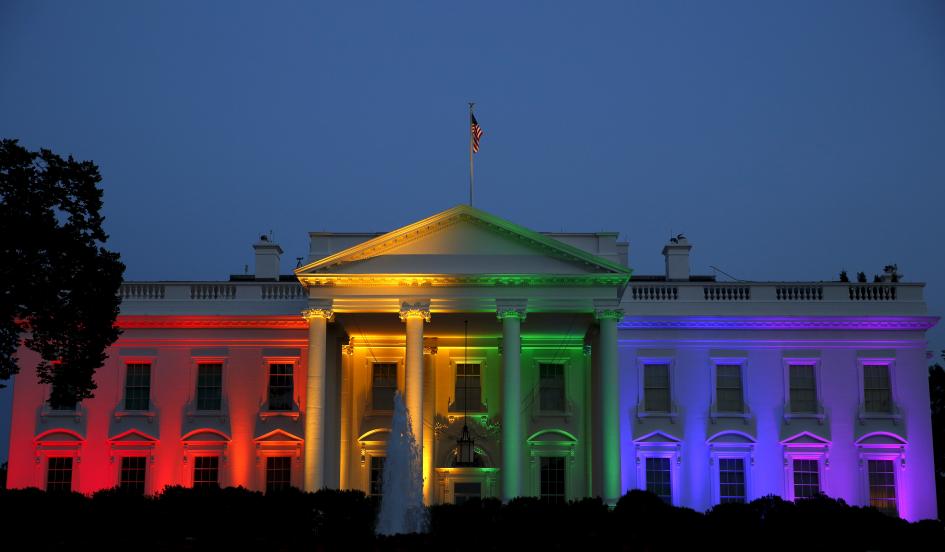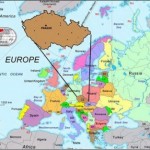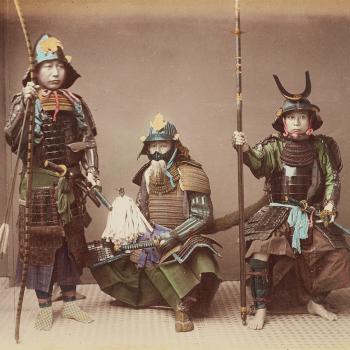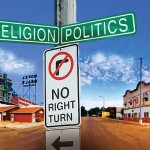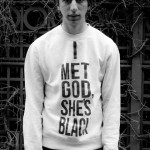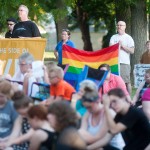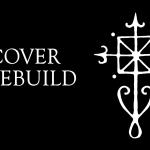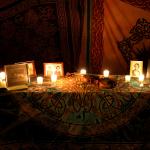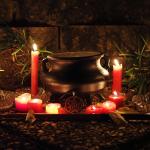“It is so ordered”
“No union is more profound than marriage, for it embodies the highest ideals of love, fidelity, devotion, sacrifice, and family. In forming a marital union, two people become something greater than once they were. As some of the petitioners in these cases demonstrate, marriage embodies a love that may endure even past death. It would misunderstand these men and women to say they disrespect the idea of marriage. Their plea is that they do respect it, respect it so deeply that they seek to find its fulfillment for themselves. Their hope is not to be condemned to live in loneliness, excluded from one of civilization’s oldest institutions. They ask for equal dignity in the eyes of the law. The Constitution grants them that right.”
That is the majority holding from the Supreme Court yesterday in Obergefell v. Hodges. In a 5-4 ruling, the Supreme Court declared that “the right to marry is a fundamental right inherent in the liberty of the person, and under the Due process and Equal Protection Clauses of the Fourteenth Amendment couples of the same-sex may not be deprived of that right and liberty”, and also that “there is no lawful basis for a State to refuse to recognize a lawful same-sex marriage performed in another State on the ground of its same-sex character.” Along the way, the Justice Kennedy took as established fact truths that were not recognized as such a decade ago, that “sexual orientation is both a normal expression of human sexuality and immutable”, that “many same-sex couples provide loving and nurturing homes to their children, whether biological or adopted”, and that extending the freedom to marry does not “denigrate” the institution of marriage, but affirms its dignity:
“The nature of marriage is that, through its enduring bond, two persons together can find other freedoms, such as expression, intimacy, and spirituality. This is true for all persons, whatever their sexual orientation. There is dignity in the bond between two men or two women who seek to marry and in their autonomy to make such profound choices.”
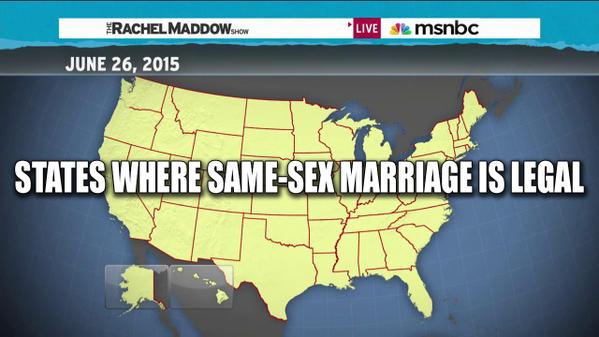
“This is the new map.” These were the words of Rachel Maddow spoke last night on her show as she reviewed history of her show’s cartographic coverage of marriage equality legislation in the U.S.
Recognition of ourselves in each other
Just hours after the Supreme Court’s decision was announced, I sat down for an office luncheon at my law firm. In the course of talking about our weekend plans, I said that I would be attending the Chicago Pride Parade this Sunday, whereupon one of our secretaries blurted out, “Are you gay?” I was too stunned to speak for a second. First, she knows I am married to a woman. Second, it was completely inappropriate to ask about someone’s sexual orientation at work. And third, it was ignorant of her to assume that one must be gay to attend a gay pride event.
We later had a more lengthy conversation where she told me that “that’s fine for them but not for me.” I’m still not sure what that means, since she is heterosexual. So why she felt that needed to be said confounds me, as did the sense I got from her that she felt she was being magnanimous in saying this. I asked her whether she even knew any gay people, and she said she had “acquaintances” but no (openly) gay friends. I told her that I thought her feelings would change if she had a gay friend and had to look them in the face and tell that that she thought their love was a sin. Or if one of her children came out as gay. It’s not always the case, but from what I have observed, people who were previously closed-minded on this issue but children come out as LGBT often do an about face. I’m thinking of Dick Cheney and other Republicans who have been “pulled to the left” by their gay children. I’m thinking of all the Mormon mothers (I used to be LDS) who have become LGBT advocates since their children came out, including at least one mother who preciously was a Prop-8 advocate. It’s just easier to be bigoted when the “other” is faceless and nameless.
The same is true of racism. Yesterday, President Obama delivered the eulogy for Charleston pastor, the Rev. Clementa Pinckney, who was killed in the “Mother Emanuel” shooting. It was a moving speech, and worth reading or listening to in its entirety. But one part stood out to me in light of the Supreme Court’s decision:
“What is true in the south is true for America. Clem understood that justice grows out of recognition of ourselves in each other; that my liberty depends on you being free, too.”
Meet the Obergefells
Justice grows out of recognition of ourselves in each other.
I believe this. And that is why I think the most important part of yesterday’s Supreme Court decision was not the legal analysis, but stories of the people whose lives are most affected by this decision. So permit me to introduce you to James Obergefell and his husband John Arthur:
“James Obergefell … met John Arthur over two decades ago. They fell in love and started a life together, establishing a lasting, committed relation. In 2011, however, Arthur was diagnosed with amyotrophic lateral sclerosis, or ALS. This debilitating disease is progressive, with no known cure. Two years ago, Obergefell and Arthur decided to commit to one another, resolving to marry before Arthur died. To fulfill their mutual promise, they traveled from Ohio to Maryland, where same-sex marriage was legal. It was difficult for Arthur to move, and so the couple were wed inside a medical transport plane as it remained on the tarmac in Baltimore. Three months later, Arthur died. Ohio law does not permit Obergefell to be listed as the surviving spouse on Arthur’s death certificate. By statute, they must remain strangers even in death, a state-imposed separation Obergefell deems “hurtful for the rest of time.” He brought suit to be shown as the surviving spouse on Arthur’s death certificate.”
“April DeBoer and Jayne Rowse … celebrated a commitment ceremony to honor their permanent relation in 2007. They both work as nurses, DeBoer in a neonatal unit and Rowse in an emergency unit. In 2009, DeBoer and Rowse fostered and then adopted a baby boy. Later that same year, they welcomed another son into their family. The new baby, born prematurely and abandoned by his biological mother, required around-the-clock care. The next year, a baby girl with special needs joined their family. Michigan, however, permits only opposite-sex married couples or single individuals to adopt, so each child can have only one woman as his or her legal parent. If an emergency were to arise, schools and hospitals may treat the three children as if they had only one parent. And, were tragedy to befall either DeBoer or Rowse, the other would have no legal rights over the children she had not been permitted to adopt.”
“Army Reserve Sergeant First Class Ijpe DeKoe and his partner Thomas Kostura … fell in love. In 2011, DeKoe received orders to deploy to Afghanistan. Before leaving, he and Kostura married in New York. A week later, DeKoe began his deployment, which lasted for almost a year. When he returned, the two settled in Tennessee, where DeKoe works full-time for the Army Reserve. Their lawful marriage is stripped from them whenever they reside in Tennessee, returning and disappearing as they travel across state lines.”
Listening to these stories, seeing these pictures, I think transforms marriage equality from a political issue into a personal issue. And it is so much more powerful for it. Justice grows out of the recognition of ourselves in each other. As heterosexual and cis-gendered Pagan, I have only the barest idea of what coming out as an LGBT must be like. That is why I think this day belongs especially to all the brave gay, lesbian, and trasngendered people who have come out and thereby made the rest of us look in the mirror to see our prejudice. Those who have come out again and again, to family, friends, co-workers, and strangers. To all those who have to decide whether to come out every time they meet someone new, like Dave who I met at church last Sunday. They are the heroes. “The nature of injustice is that we may not always see it,” wrote Justice Kennedy. It is due to these brave people that we can now see it. It is due to them that we learned today a new and more expansive meaning of the word “justice”.

